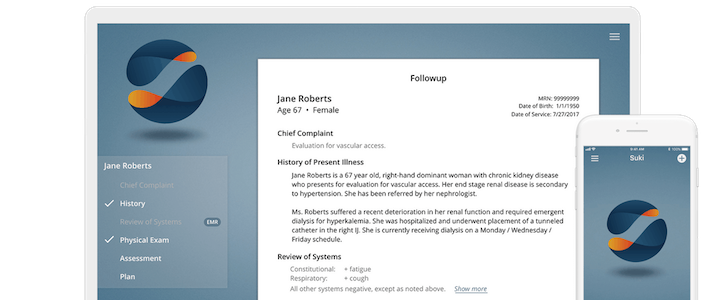- Politics
- Diversity, equity and inclusion
- Financial Decision Making
- Telehealth
- Patient Experience
- Leadership
- Point of Care Tools
- Product Solutions
- Management
- Technology
- Healthcare Transformation
- Data + Technology
- Safer Hospitals
- Business
- Providers in Practice
- Mergers and Acquisitions
- AI & Data Analytics
- Cybersecurity
- Interoperability & EHRs
- Medical Devices
- Pop Health Tech
- Precision Medicine
- Virtual Care
- Health equity
Alexa for Doctors Claims 70 Percent Reduction in EHR Time
Will Suki become a part of the clinic of tomorrow?

Suki said its artificial intelligence digital assistant can help doctors reduce time spent on medical notes.
Suki, the artificial intelligence (AI) voice assistant for healthcare professionals, launched in May to praise from health-tech innovators who hoped “Alexa for doctors” might slash electronic health record (EHR) documentation time.
If the company’s early numbers are any indication, that wish might come true.
Suki said today that doctors who use the digital assistant have seen a 70 percent drop in time spent writing and filing medical notes. That figure is 10 percentage points better than the preliminary results of Suki’s pilot. The finding could prove powerful, as research has suggested that physicians burn almost two hours in the EHR for every hour of patient interaction.
>> READ: Amazon’s Alexa Really Isn’t Ready for Healthcare
“We are proud of the progress made since introducing Suki in May and excited to be freeing more and more physician from the arduous burden of medical documentation to focus on their first priority: patient care,” Suki co-founder and CEO Punit Soni, MBA, M.S., said in a statement.
Although Suki’s announcement didn’t note the number of physicians using the technology, it said adoption tripled since the early pilot. Doctors who practice in seven different specialties, across eight states, use the voice assistant.
Suki has processed more than 12,000 patient encounters in the real world, handling 1,000 per week, according to the company. This steady stream of real-world data is poised to strengthen the technology’s machine-learning algorithm, which was trained on 250,000 patient encounters before it went live.
So far, Suki has integrated with three EHR systems. The company said that number is slated to rise.
Using voice commands, the technology pens a “clinically accurate” note that it then sends to a doctor’s EHR system.
Over the past several years, innovators across healthcare have advocated for a clinical voice assistant. But the challenges are many, from precise listening and documentation to satisfying cybersecurity concerns.
When the prospect of this tech comes up, healthcare hopefuls tend to tie the conversation to Amazon and its Alexa smart speaker, which has grown in popularity in recent years. While Alexa has made small strides into health, it doesn’t appear to be Amazon’s chief clinical focus. What’s more, the device has its own privacy baggage, which was spotlighted in a disturbing incident earlier this year.
Suki, meanwhile, has an impressive workforce stocked with Silicon Valley veterans. Soni, the co-founder, cut his teeth at Google, Motorola and Flipkart. Other leaders and tech workers have spent time at Apple, Salesforce, 23andMe and some of the nation’s top universities. Healthcare professionals also work for Suki.
Although a clinical AI assistant might be far off for many providers and health systems, Suki and similar technologies could help solve a mounting problem in medicine: physician burnout. Each new study, it seems, suggests burnout is affecting a substantial number of physicians to great detriment. A recent review, for example, suggested that burnout is associated with suboptimal patient care, and doctors who feel this way are more likely to be involved in patient safety incidents.
Time spent in the EHR has been linked to physician burnout. On the conference circuit and in the opinion pages, doctor after doctor describes the stresses of medical note documentation — and how these demands eat up time and detract from care delivery.
Can Suki help improve workflows? It seems so. But can it go a step beyond and help physicians overcome burnout? Maybe. The answer to that question will depend on adoption rates and how Suki performs at scale.
Get the best insights in healthcare analytics directly to your inbox.
Related
Overcoming the Cultural Resistance to Health Tech
